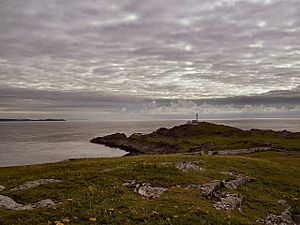Inishtrahull Lighthouse facts for kids
 |
|
| Distant view of the lighthouse | |
| Location | Inishtrahull Island |
|---|---|
| Coordinates | 55°25′52.5″N 7°14′30.4″W / 55.431250°N 7.241778°W |
| Year first constructed | 1813 (first) |
| Year first lit | 1958 (current) |
| Automated | 1987 |
| Construction | concrete tower |
| Tower shape | cylindrical tower with balcony and lantern |
| Markings / pattern | white tower |
| Height | 23 metres (75 ft) |
| Focal height | 59 metres (194 ft) |
| Original lens | Pharos 350mm lens |
| Range | 19 nautical miles (35 km; 22 mi) |
| Characteristic | Fl (3) W 15s |
| Admiralty number | A6164 |
| NGA number | 7236 |
| ARLHS number | IRE-045 |
| Ireland number | CIL-1480 |
The Inishtrahull Lighthouse is a very important lighthouse in Ireland. It stands on Inishtrahull Island, which is off the coast of County Donegal. This lighthouse is the most northern one in all of Ireland!
Along with the lighthouse on Tory Island, Inishtrahull Lighthouse helps guide ships. These lights are super important for ships coming from the Atlantic Ocean. They help them safely navigate around the northern coast of Ireland. They also guide local boats.
Contents
Inishtrahull Lighthouse: A Guiding Light
Where is Inishtrahull Island?
Inishtrahull Island is a small, rocky island. It is located about 10 kilometers (6 miles) off the coast of Malin Head. Malin Head is the most northern point of mainland Ireland. The island is quite remote and exposed to the wild Atlantic weather.
A Look Back: Its History
The story of the Inishtrahull Lighthouse began a long time ago. Work on the very first lighthouse started in 1812. It was built on the east side of the island. The Royal Navy needed this light. Their ships often used Lough Foyle, a large inlet nearby.
A man named George Halpin designed the first lighthouse. He was a Senior Inspector of Lighthouses. He worked for a group called the Corporation for Preserving and Improving the Port of Dublin.
The First Light Shines
The first light from the lighthouse shone on March 17, 1813. The tower was about 12.8 meters (42 feet) tall. Later, in 1864, a special lens system was added. This system, called a dioptric apparatus, made the light even stronger. It started working on September 29, 1864.
Fog Signals and New Lighthouses
At the start of the 1900s, people decided a fog signal was needed. This signal would help ships in foggy weather near Malin Head. They chose to build it on the west side of Inishtrahull Island. This fog signal started working in 1905. So, for a while, there were two separate stations on the island. One was the original lighthouse, and the other was the new fog signal station.
Building the Current Lighthouse
In 1952, the Commissioners of Irish Lights decided to upgrade the fog signal. They also decided to build a brand new lighthouse right next to the fog signal station on the west side of the island. The old lighthouse on the east side would then be turned off.
The lighthouse we see today was finished in 1958. It began guiding ships on October 8, 1958. This modern tower is 23 meters (75 feet) tall up to its balcony. The lantern, which holds the light, is 19 feet tall.
Modern Changes and Automation
In 1987, the lighthouse got another big upgrade. Its lens system had to be replaced. This was done to follow new rules from the International Association of Lighthouse Authorities. These rules help make sure lighthouses around the world work well together.
Automation and Solar Power
The lighthouse became automated in March 1987. This means it no longer needed people living there to operate it. Machines took over the job! On April 30, 1987, at noon, the lighthouse became unmanned. The fog signal was also turned off the very next day.
Later, on September 20, 2000, the lighthouse switched to solar power. This is a very eco-friendly way to power the light. It uses energy from the sun!
The Inishtrahull Lighthouse continues to be a vital beacon. It helps ships navigate safely along Ireland's northern coast.
 | Mary Eliza Mahoney |
 | Susie King Taylor |
 | Ida Gray |
 | Eliza Ann Grier |

